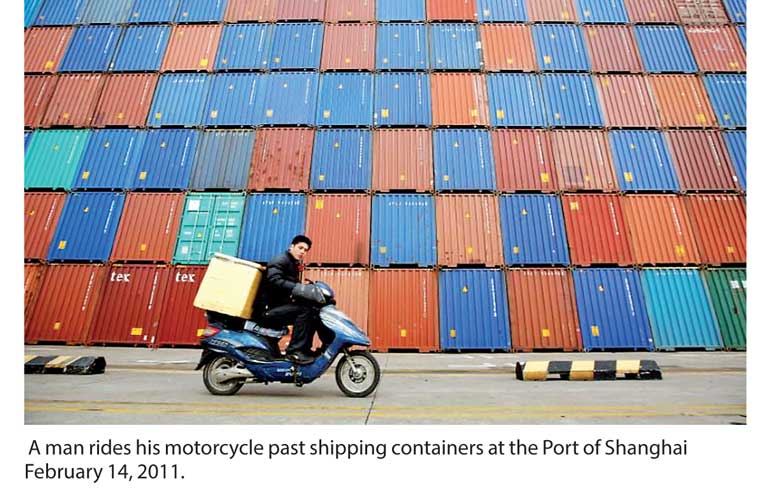Monday Feb 23, 2026
Monday Feb 23, 2026
Friday, 11 August 2017 00:00 - - {{hitsCtrl.values.hits}}
 Beijing (Reuters): China’s exports and imports grew much less than expected in July, raising concerns over whether global demand is starting to cool even as major Western central banks consider scaling back years of massive stimulus support.
Beijing (Reuters): China’s exports and imports grew much less than expected in July, raising concerns over whether global demand is starting to cool even as major Western central banks consider scaling back years of massive stimulus support.
China and Europe have been driving an increasing share of global growth this year as political conflict stymies stimulus policies being pushed by U.S. President Donald Trump.
But while China’s overall trade continued to grow at a healthy clip in July, at 8.8% it was the slowest rate this year.
Some analysts chalked up the softer readings to seasonal or one-off factors, but others said weaker import growth could be the first tangible sign of a long-expected slowdown in the world’s second-largest economy after a surprisingly strong first half.China’s export growth slowed to 7.2% in July from a year earlier, the weakest pace since February and cooling from an 11.3% rise in June, official data showed on Tuesday. Analysts had expected a 10.9% gain.
By contrast, neighboring South Korea saw its export growth accelerate in July while Taiwan’s held roughly steady.
China’s imports rose 11.0%, the slowest growth since December and down from a 17.2% rise in the previous month. That also missed expectations of 16.6% growth.
That left the country with a trade surplus of $46.74 billion for the month, the highest since January, compared with forecasts for $46.08 billion and June’s $42.77 billion. The July trade figures are preliminary.
The disappointing China data came a day after ratings agency Fitch upgraded its outlook for the world economy for this year and next, citing recoveries in China and other emerging markets.
Improving global demand, particularly for electronics, has boosted exports for China and other trade-reliant Asian economies in recent months after several lean years of declining shipments.
But investors have been more focused on its strong appetite for imports, particularly industrial commodities such as iron ore and coal, which have sparked a global price rally and fueled higher earnings and share prices for many resource-related companies.
China’s iron ore imports in July fell from 2.4% from a year earlier as a recent buying spree eased, even though higher steel prices and a year-long construction boom have spurred mills in the world’s biggest steel producer to ramp up output.
Despite a sharp rebound in the value of the yuan versus the dollar in recent months – the yuan has gained 3.5% so far this year – analysts downplayed its impact on trade flows.
In yuan terms, growth in exports and imports also downshifted markedly, to 11.2 and 14.7%, respectively.
Tuesday’s data also showed China’s exports to the United States rose 8.5% in July on-year, the slowest pace since February, while imports from the U.S. rose 24.2%.
But that is unlikely to ease trade tensions between Washington and Beijing, which have escalated in recent months as Trump has pressed China to cut steel production to ease global oversupply and rein in North Korea’s missile program.
China reported a trade surplus with the U.S. of $25.2 billion for July, down only slightly from June, which was a near two-year high.
For the first seven months of the year, China’s trade surplus with the U.S., its largest export market, rose 5.9% to $142.75 billion, even as China’s overall trade surplus has fallen.
China may have more at stake than past years if relations with Washington sharply deteriorate.
Its surplus with the U.S. accounted for 61.5% of China’s total trade surplus in the first seven months of the year, compared to just 44% in the year-ago period.
The United State and China failed last month to agree on major new steps to reduce the U.S. trade gap.
Trump had been expected to unveil new measures last week, as Washington prepares to launch an inquiry into Beijing’s intellectual property and trade practices. But an announcement on Friday was postponed.
The White House said on Saturday that Trump appreciated China’s cooperation on new sanctions against North Korea that were passed over the weekend.